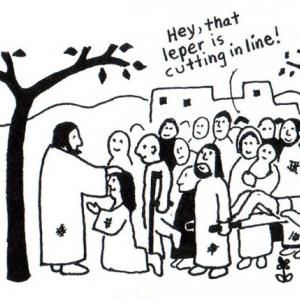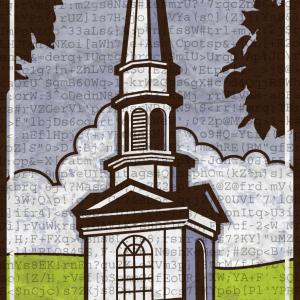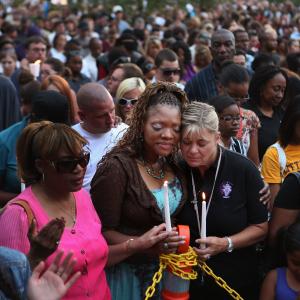
Nadia Bolz-Weber is the founder and former pastor of House for All Sinners and Saints, an ELCA mission church in Denver, Colorado. She’s a leading voice in the emerging church movement, and her writing can be found at www.nadiabolzweber.com and on the Sarcastic Lutheran blog. Her most recent book is Shameless: A Sexual Reformation (Convergent Books).
Posts By This Author
Honor Thy Sexual Pleasure?
The Christian ethic of sex needs a transformation.
EVERY WEDNESDAY night, Sam’s youth group met in a darkened gymnasium dressed up as a rock concert: decorative fabrics, professional sound equipment, and a light show. A thin, attractive youth pastor with a soul patch and skinny jeans would deliver a message about the evils of sex, drugs, and alcohol.
In Matthew’s gospel, Jesus says, “You have heard that it was said, ‘You shall not commit adultery.’ But I say to you that everyone who looks at a woman with lust has already committed adultery with her in his heart.” This was a favorite verse of Sam’s youth pastors, who wielded it to warn kids against even thinking about sex. If lusting after a woman was just as bad as committing adultery, their logic held, then even thinking about sex is a sin.
“The weird thing,” Sam told me, “was that it wasn’t date rape or sexual harassment or even treating people disrespectfully that they were worried about. It was ‘impure thoughts’ and lust.”
There are two problems that I see here: One, these were teenagers, whose bodies are designed by God to become sexual, and two, the Greek word for lust, epithymia, is about general desire, not thinking sexual thoughts. If epithymia was a term for sexual desire, it would make some other things Jesus said super weird. (For example, Luke 22:15: “And he said to them, I have had sexual thoughts about eating this Passover with you before I suffer.”)
Sermon on Jesus Rolling His Eyes (And Also Divorce)
I thought how the hell is it that the church can manage to take a text meant to protect people and make sure violence is not done to them, and then use this same text to do violence to so many for so long?
Keeping the Faith in Trump's America
Six accounts of resistance and healing in the era of Trump.

Jmaggiophoto / Shutterstock.com
"In the wake of this election, the role of faith communities is imperative," writes Jim Wallis in "Resistance and Healing." With this in mind, we asked a few Christian leaders how followers of Jesus can best practice resistance and healing in Trump's America. Though varied, the responses we received have a common theme: Christians must stand in solidarity with the vulnerable. Now and always. —The Editors
Resistance is Holy Work
by Brittany Packnett
RESISTANCE IS HOLY WORK. Resistance is what it means to tell the truth and defend people in public, even—and especially—when it is inconvenient, dangerous, and uncomfortable.
What truths must we tell? We must tell the truth that the entire world is not white, straight, Christian, cis-gendered, American-born, male, or able-bodied, and that those of us who aren’t matter just as much as those of us who are. We must tell the truth that rhetoric and policies that encourage violence against those same people is not of God and not of the freedom we espouse. We must tell the truth that if all of us were truly created equal, then the cancer of xenophobia makes all of us sick—and that none of us are truly free until we are all free.
We did not lose an election as much as we validated and normalized a way of life that is beneath our humanity—and, therefore, which requires our resistance. The Christ I serve did not sit idly by in times like these—for in eras like this one, inaction is a sin. Inaction perpetuates this latest wave of hate just as much as if you painted a swastika yourself. Hate should never be welcome in our homes, at our tables, in our worship, or in our country.
It is holy to resist such things. Holy resistance means calling out that hate by name and casting it out of where you are—of where you want God to be. Casting it out means no longer making excuses that your grandfather just talks like that because he is elderly; it means withholding your tithes and membership from those places that will not be safe havens and sanctuaries for those persecuted under potential new rules of law; it means challenging the notion that we stitch together a false unity rather than acknowledge the explicit danger many of us are now placed in.
Holy resistance means praying for those who persecute—but protecting the persecuted. Christians must be people of moral conscience, those who conscientiously object to hatred, division, racism, and sexism as unashamedly as we claim Christ. The call to be in the world and not of it was for such a time as this—we must be the light that shines on injustice and calls out our humanity to replace the evil we see.
Resistance is holy work. That makes it our work.
Meaningless Church Jargon
Earlier this morning, I saw a tweet from @JesusofNazareth316: Blessed are they who stop using the word “#missional," which caused me to post something on Twitter and Facebook asking people what their favorite church jargon is — mine being “Missional Imagination.” The response was unbelievable and also quite interesting.
I realized upon reading the #meaninglesschurchjargon tweets that the responses tended to fall into several categories:
1. Mainline Protestant church consultant/bad seminary class lingo. (“Missional imagination”; congregations as “centers for evangelical mission”; pastors as “transformational leaders”; referring to members as “giving units”; and churches “doing life together”) this language has a commonality with corporate jargon and like corporate jargon, refers to the culture and practices related to an organization.
IDEA: Let’s make sure that in seminary classrooms and at church conferences and in congregational life when we use a term or a phrase, that it points to an actual thing or person or event and is not just a string of words that sound like something meaningful but, in fact, lack real meaning. There is a reason that my computer does not recognize the word Missional. Try it at home. Go ahead. Type that shit and see.
Sermon About How Totally Uncool We Are
I have this friend Caitlin who tends to just tell me the truth about things, which isn’t always comfortable.
Caitlin and I close friends but are really different people, and years ago we were both planning our 40thbirthday parties. Mine was a roller disco party at a rink I rented out – and hers was a group of close friends watching the sunrise on a hill over looking the city, which made me comment that Caitlin has so many personality traits that are just truly lovely and that I don’t have those same traits and she said “Of course you do Nadia, they just aren’t your favorite ones.”
I thought about that this week when I was reading our Gospel text and how Jesus seems to be addressing the things we do or don’t do so that we can be thought of in a certain way. As though he can just see right through us. Which is just the worst.
The Parameters We Prefer Jesus to Work Under

Jesus healing the lepers, © Daniel W. Erlander, http://danerlander.com
I have to say, one of my very favorite things about Jesus is how he does whatever he wants to and could really give a hell about how other people feel about it. Yeah. I just find that endearing — especially when he irritates the nice religious people. That’s secretly my favorite.
In our Gospel text for today Jesus is teaching in the synagogue on a Sabbath when he sees a woman with a crippled back. He saw her, called her over and said “Woman you are set free from your ailment.” He reached out and touched her and she stood upright for the first time in 18 years and praised God — which seems like a win. Except for that then the leader of the synagogue throws a little tizzy about how that kind of thing should not be happening on the Sabbath. Further proof that super religious people can just be so helpful, can’t they?
Especially when they seem to value parameters over people – which should sound like a familiar story …
Stories of churches denying your call to ministry because you fall outside the parameters of which gender is allowed to be ordained and stories of churches denying you the Eucharist because you fall outside the parameters of what kind of sexual orientation is allowed to receive the means of grace and stories of churches denying you a place in community because you just weren’t sure if you believed in God and that falls outside the parameters of doctrinal purity – well, these kind of stories are sadly bordering on cliché around here. We hear them all the time.
Mary, Martha, and the Main Thing
Just to get it out there, this story about Mary and Martha has always irritated me, because I think Martha is awesome, and she’s always made out to be a busy-body and a whiner.
See, Jesus is welcomed into the home of Mary and Martha and the thing to understand is that Jesus didn’t exactly travel alone. Dude had an entourage — so to welcome Jesus is to welcome who Jesus brings in with him. And to extend hospitality to that many people takes a lot of work, so Martha becomes understandably overwhelmed by her tasks and tries to get Jesus to talk her sister Mary into helping her, since Mary up until this point has only been sitting at Jesus’ feet listening. Jesus tells Martha that Mary has chosen the better part and it will not be taken from her.
Beanie Babies, Scarcity, and Vanity
Welcome to Ecclesiastes. All is vanity. Nothing ends up mattering. Everything for which we toil is fricken pointless.
If the writer of Ecclesiastes were around today, I’m pretty certain s/he would be a really emo teenager in black skinny jeans who smokes clove cigarettes alone in his/her room listening to Morrissey or My Chemical Romance.
For someone like myself who is just a wee bit prone to cynicism, the fact that there is something in the Bible so whiny and sardonic about the futility and pointlessness of human activity is kind of delightful.
Because oh my gosh do people busy themselves with some fleeting ridiculousness while thinking it matters.
Misery Loves Comedy
"Pastrix: The Cranky, Beautiful Faith of a Sinner & Saint" by Nadia Bolz-Weber
DURING MY EARLY years of sobriety, I spent most Monday nights in a smoke-filled parish hall with some friends who were also sober alcoholics, drinking bad coffee. Pictures of the Virgin Mary looked down on us, as prayer and despair and cigarette smoke and hope rose to the ceiling. We were a cranky bunch whose lives were in various states of repair. There was Candace, a suburban housewife who was high on heroin for her debutante ball; Stan the depressive poet, self-deprecating and soulful; and Bob the retired lawyer who had been sober since before Jesus was born, but for some reason still looked a little bit homeless.
We talked about God and anger, resentment and forgiveness—all punctuated with profanity. We weren’t a ship of fools so much as a rowboat of idiots. A little rowing team, paddling furiously, sometimes for each other, sometimes for ourselves; and when one of us jumped ship, we’d all have to paddle harder.
In 1992, when I started hanging out with the “rowing team,” as I began to call them, I was working at a downtown club as a standup comic. I was broken and trying to become fixed and only a few months sober. I couldn’t afford therapy, so being paid to be caustic and cynical on stage seemed the next best thing. Plus, I’m funny when I’m miserable.
This isn’t exactly uncommon. If you were to gather all the world’s comics and then remove all the alcoholics, cocaine addicts, and manic depressives you’d have left ... well ... Carrot Top, basically. There’s something about courting the darkness that makes some people see the truth in raw, twisted ways, as though they were shining a black light on life to illuminate the absurdity of it all. Comics tell a truth you can see only from the underside of the psyche.
Sermon — Prayer, Actually — on Jesus Loving Us So Much He Wants to Throw Up
A few years ago I wrote a book about the experience of watching 24 consecutive hours of bad Christian television. My friends and family signed up for an hour each to watch along with me. The whole thing was insane, but things got especially crazy around 1 a.m. when a show called the Power Team was on. Now, thePower Team are a bunch of enormous steroid-muscled men who hold really loud Christian rallies in which they tear phone books in two and break 2x4s over their heads by the power of the Holy Spirit. And they talk a lot about what “the Lord” had done for them. It’s impressive stuff.
Anyway, so our own Andie Lyons was watching with me along with my friend Jerry. And the three of us watched in stunned silence for a moment trying to understand what it was we were seeing, at which point Andie finally said “so wait, basically they break stuff for the Lord?” and I answered yes, and then Jerry said “big deal, I break stuff all the time,” to which Andie asked, “but is it for the Lord?” and Jerry said, “well, it is now!”
Honestly the only reason I told you this story is by way of saying that I’m not a fan of the over-use of the term “the Lord. ”Like when people say “I just love the Lord,” I just never really know what that means. The way it’s casually thrown around makes me uncomfortable especially after Harry Potter, since Voldemort is called the Dark Lord. I just, I don’t know, I’m not saying it’s wrong, I’m just saying that for whatever reason, I can’t handle it.
Sermon On Why Hope and Vapid Optimism Are Not The Same Thing
… suffering produces endurance, and endurance produces character, and character produces hope, and hope does not disappoint us.
-Romans 5
As many of you know, I have a regular spiritual practice of warning people that I will disappoint them. A couple times a year, we host a Welcome to House for All Sinners and Saints brunch for newcomers. Everyone goes around the room saying what drew them to this community or what keeps them here. They usually say it’s a comfortable place where they can just be who they are or they love the singing or the community. One time someone said that their mom was Catholic and their dad was atheist and that this church kinda felt like a combo of the two. And while I wasn’t entirely sure I knew what that meant, I thought it was awesome.
Well, I usually am the last to speak at these events and when I do and I always say how great it is to hear all of that, but that I need them to hear something. And that is that this church will disappoint you. Or I will fail to meet your expectations, or I’ll say something stupid and hurt your feelings. It’s not a matter of if it’s when. Welcome to House for All Sinners and Saints. We will disappoint you.
Sermon on Baptism and the Devil
In the church of my childhood it was taught that the “age of accountability” was somewhere around 12. To hit the age of accountability was to, like, spiritually go off of your parents’ insurance. At age 12 the clock starts ticking, spiritually speaking; you know right from wrong now and because of this you are accountable for every time you screw up. And if you sin knowing right from wrong and then die before you chose to be baptized, you might burn in Hell for eternity. So age 12, as you can imagine, is when kids start choosing to get baptized. The lag time between entering the age of accountability and having your slate wiped clean through baptism can be terrifying. Many of us kids would pray not to die in a car crash before we were baptized, like other people pray to not get sick before their employee benefits kick in. So basically, 12-year-old Church of Christ kids experience a wave of devotion like a Great Awakening comprised only of sixth graders. And this is partly because we were all terrified of the devil and temptation and sin. Since, as we were told, all the bad things we’d done may have been washed clean in baptism, but the devil was waiting right outside the baptistery to try and get us to be bad again.
A Sermon on Hacking Off Our Own Limbs for Jesus
Were I one for object lessons I’d have brought a nice sharp axe with me into the pulpit today. Because it’s only once in awhile that we get to hear Jesus talk about brutal self-mutilation as a sign of discipleship.
Growing up I was terrified of those verses in Mark’s Gospel that we just heard – the ones where Jesus suggests that if your hand causes you to sin cut it off, and if your foot causes you to sin hack that off too, and if your eye causes you to sin gauge the sucker out. I remember the summer I was 11 years old when I stole candy from KMart and then hid it in the heat duct in my room. And I remember hearing this passage soon after that and thinking how my hand had indeed caused me to sin. And then and there I decided to never steal again lest Jesus insist I hack off my own limbs.
The problem, of course, is that my hand has never caused a darn thing. My eye doesn’t cause me to sin. My foot can’t be held accountable for my missteps. If you want to find the culprit behind my sin don’t look at my hand. Look at my heart. My poor feet just do what they’re told.
Sermon on Snot-Nosed Children, Insecurity, and The Lap of God
A couple days ago I called my friend Kae so we could talk about this Gospel reading where Jesus takes a child in his arms and teaches the disciples that if they welcome a child in his name they welcome God. And we started talking about the actual reality of children and how difficult small ones can be to manage. Kae told me of this brilliant technique she employs when dealing with toddlers.
She said it really helps her to be patient and compassionate with defiant, emotional, snot-faced toddlers when she just thinks of them like little versions of really drunk friends. Then when they keep falling down and bumping into things and bursting into tears she just treats them like she would a friend who is too drunk to know what they are doing, and who you just try and make sure doesn’t hurt themselves, and who you clean up bodily fluids from, and make sure they drink some water, and then just lovingly change them into their pajamas and tuck them into bed.
Children are really a mess.
Sermon for Ordination: You Don't Have What It Takes — But You Have a God Who Does
Years ago on a bright Tuesday in March, I was driving to seminary and I found myself stuck in traffic on I-25. Sitting in a dead stop on the interstate I stared up into the clear blue Colorado sky and thought, “What in the world am I doing? I don’t believe a word of this Jesus stuff. I mean, It’s a fairy tale.”
But then in the very next moment I thought, “Except…throughout my life…I have experienced it to be true.”
I experience the gospel to be true even when I can’t believe it. And honestly sometimes I believe the gospel even when I don’t experience it. And I suggest to you today that this is why we have and even why we need Word and Sacrament. Because see, we are a forgetful people.
And it is to this office of Word and Sacrament that you have been called Matthew and I feel like in an ordination sermon, the preacher should in some way address the level of preparedness of the ordinand in question, and I am in a position to do just that.
Sometimes It Hurts; A Sermon on Healing
When Jesus showed up, I think it’s interesting that he took that deaf man away from the THEY. He removes him from that system. He sticks his fingers in his ears and spits and touched his tongue and looks to heaven and the text says, he sighed. He looked to heaven and sighed. And the thing is, Jesus didn’t then rebuke the man or his deafness. He didn’t say, I cast out the demon of deafness. He just touched him, looked to heaven, sighed and said “BE OPEN."
It’s a wonderful statement for healing isn’t it? Be open.
It’s an image that’s stuck with me all week. This might sound weird but all week I kept picturing Jesus sticking his fingers in each of your ears and saying “BE OPENED." And then in the same daydream, before I could stop it, I pictured Jesus’ Holy and unwashed fingers in my own ears. He sighed he looked to heaven and he said, "Be opened." To which I said, “No thanks."
'This Teaching is HARD. Who Can Accept It?': A Sermon on Eucharist
Every three years, the assigned readings during the summer include five weeks of working our way through the Gopel of John, chapter 6, and what is called the "Bread of Life Discourse." And let’s just say that if Trey Parker and Matt Stone wrote a musical called The Book of John they’d have plenty of material from just this chapter alone.
In the last five weeks we’ve gone from the feeding of the 5,000 to Jesus walking on water in the middle of a storm at sea — by the way, Jesus walks on water during a storm at sea so often in the gospels that I’ve started thinking it was less about being miraculous and more about just getting in some cardio — anyhow, the crowd chased him down, demanding more bread, and then he goes and says that he is the Bread of Life come down from heaven (which angered the nice religious folks), and rather than backing off, he makes it even weirder by saying whoever eats his flesh and drinks his blood has eternal life.
Which is where we pick up today when some of his disciples are like, “Uh Jesus, that teaching is HARD…who can accept it?” And many of them leave. And I have to say, I don’t really blame them.
This teaching IS hard. But honestly, Jesus had a lot of sayings that were HARD. Sayings such as, " Love your enemies and pray for those who persecute you," "You who are without sin cast the first stone," "Sell all you have and give it to the poor," "The first shall be last and the last shall be first," and "If you seek to save your life you will lose it."
I totally understand the reaction of these disciples who say these teachings are hard, who can accept them?
But this week I started to wonder if maybe those disciples didn’t have to leave Jesus … I mean, when we make the accepting of hard teachings the litmus test for being a follower of Jesus, I wonder if we are perhaps missing the point altogether.
Sermon on Eternal Life and Living Like Liberace With Your Mom and Her Friends Forever
Jesus said to them, Very truly, I tell you, whoever believes has eternal life. I am the bread of life. - John 6:47-48
When I was in my 20s and totally out of control and pretty much estranged from my conservative Christian parents I used to joke about how my mom would try and guilt me into connecting with them more often by saying in her Kentucky accent “Nadia, the least you could do is come visit us more often … since we won’t be spending eternity together." Which made me wonder if the church she went to realized that the promise of spending eternity with my mom and her friends wasn’t exactly the best-selling point. At least not for a 21 year old.*
But that’s kind of what I was taught: that being a Christian was all about where you will spend eternity after you die – kind of like purchasing a life-insurance plan for the hereafter. And if you manage to be good enough here on earth then when you die you get to go to heaven and be like the spiritual 1 percent for eternity and live in big mansions with Jesus and wear awesome jewels and walk streets of gold.
Which made it sound like eternal life is basically about getting to live like Liberace Forever.
All Sinners, All Saints, All Welcome
Editor's Note: God's Politics contributor, Nadia Bolz-Weber, recently delivered an address to the Evangelical Lutheran Church in America's (ELCA) Youth Gathering in New Orleans, where she told the story of her spiritual journey from tattooed, alcoholic ne'erdowell to tattooed, 20-years-sober, Lutheran minister. Nadia's is a powerful tale of redemption, God's unconditional love, and staggeringly real grace.
Nadia told the thousands of Lutheran youth gathered in the Big Easy earlier this month:
Some of your parents and some of your pastors were really upset that I was your speaker tonite. They felt like I was someone who should not be allowed to talk to tens of thousands of teenagers. And you know what I have to say to that? They are absolutely right.
Somebody with my past of alcoholism and drug abuse and promiscuity and lying and stealing should not be allowed to talk to you. You know what? Somebody with my present — who I am now — shouldn't be allowed to talk to you because I am sarcastic, heavily tattooed, I swear like a truck driver — they're having a heart attack back there, going, "Please help her not swear."
I am a flawed person. I should not be allowed to be here talking to you. But you know what? That's the God we're dealing with, people.
Mary Magdalene, the Massacre in Our Town, and Defiant Alleluias
As a woman preacher, I can’t help but love St. Mary Magdalene. She was the first witness to the resurrection. When I first discerned my call to be a preacher I got a tattoo of her on my forearm – it’s from a rare depiction in ancient Christian art – of her proclaiming the resurrection to the apostles. I felt that when I needed to, I could borrow her strength. And since July 22 is her feast day, we decided weeks ago to ditch the normal Sunday readings and celebrate her as an important saint to us.
But then Friday happened. I was still in New Orleans when I saw the news of the shooting. After praying that you were all safe I soon thought, “we can’t really hold a celebration of a saint today … it just wouldn’t make any sense.”
I had gone to New Orleans with an idea for a sermon on Mary Magdalene – a sermon about who gets to speak in the Bible and who gets to be named and blah, blah, blah.
And just as I was about to ditch it all and go with the regularly assigned reading for today, I went back and again read this story of Mary Magdalene at the tomb and realized, given the violence and terror thrust upon our community this week, that maybe Mary had more to say about it than I could. I decided again to borrow strength and voice from her. So were I a pastor who titled her sermons, this one would be WWMMP – "What Would Mary Magdalen Preach?"

















